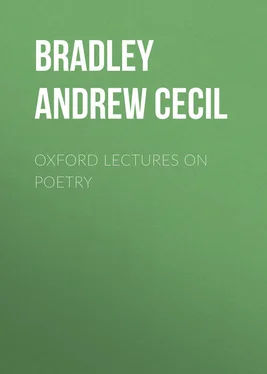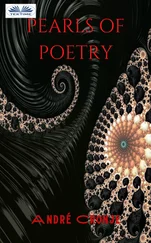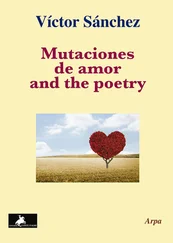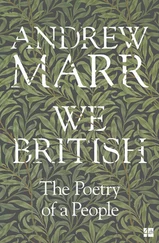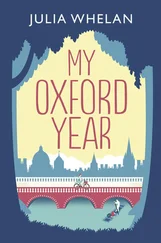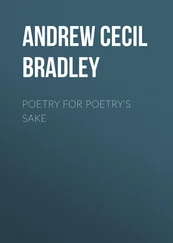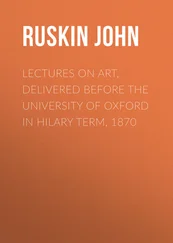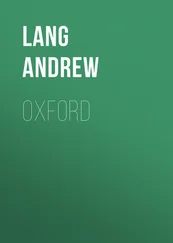Andrew Bradley - Oxford Lectures on Poetry
Здесь есть возможность читать онлайн «Andrew Bradley - Oxford Lectures on Poetry» — ознакомительный отрывок электронной книги совершенно бесплатно, а после прочтения отрывка купить полную версию. В некоторых случаях можно слушать аудио, скачать через торрент в формате fb2 и присутствует краткое содержание. ISBN: , Жанр: foreign_antique, foreign_prose, foreign_poetry, на английском языке. Описание произведения, (предисловие) а так же отзывы посетителей доступны на портале библиотеки ЛибКат.
- Название:Oxford Lectures on Poetry
- Автор:
- Жанр:
- Год:неизвестен
- ISBN:http://www.gutenberg.org/ebooks/36773
- Рейтинг книги:4 / 5. Голосов: 1
-
Избранное:Добавить в избранное
- Отзывы:
-
Ваша оценка:
- 80
- 1
- 2
- 3
- 4
- 5
Oxford Lectures on Poetry: краткое содержание, описание и аннотация
Предлагаем к чтению аннотацию, описание, краткое содержание или предисловие (зависит от того, что написал сам автор книги «Oxford Lectures on Poetry»). Если вы не нашли необходимую информацию о книге — напишите в комментариях, мы постараемся отыскать её.
Oxford Lectures on Poetry — читать онлайн ознакомительный отрывок
Ниже представлен текст книги, разбитый по страницам. Система сохранения места последней прочитанной страницы, позволяет с удобством читать онлайн бесплатно книгу «Oxford Lectures on Poetry», без необходимости каждый раз заново искать на чём Вы остановились. Поставьте закладку, и сможете в любой момент перейти на страницу, на которой закончили чтение.
Интервал:
Закладка:
Again, it is surely true that we cannot determine beforehand what subjects are fit for Art, or name any subject on which a good poem might not possibly be written. To divide subjects into two groups, the beautiful or elevating, and the ugly or vicious, and to judge poems according as their subjects belong to one of these groups or the other, is to fall into the same pit, to confuse with our pre-conceptions the meaning of the poet. What the thing is in the poem he is to be judged by, not by the thing as it was before he touched it; and how can we venture to say beforehand that he cannot make a true poem out of something which to us was merely alluring or dull or revolting? The question whether, having done so, he ought to publish his poem; whether the thing in the poet’s work will not be still confused by the incompetent Puritan or the incompetent sensualist with the thing in his mind, does not touch this point: it is a further question, one of ethics, not of art. No doubt the upholders of ‘Art for art’s sake’ will generally be in favour of the courageous course, of refusing to sacrifice the better or stronger part of the public to the weaker or worse; but their maxim in no way binds them to this view. Rossetti suppressed one of the best of his sonnets, a sonnet chosen for admiration by Tennyson, himself extremely sensitive about the moral effect of poetry; suppressed it, I believe, because it was called fleshly. One may regret Rossetti’s judgment and at the same time respect his scrupulousness; but in any case he judged in his capacity of citizen, not in his capacity of artist.
So far then the ‘formalist’ appears to be right. But he goes too far, I think, if he maintains that the subject is indifferent and that all subjects are the same to poetry. And he does not prove his point by observing that a good poem might be written on a pin’s head, and a bad one on the Fall of Man. That truth shows that the subject settles nothing, but not that it counts for nothing. The Fall of Man is really a more favourable subject than a pin’s head. The Fall of Man, that is to say, offers opportunities of poetic effects wider in range and more penetrating in appeal. And the fact is that such a subject, as it exists in the general imagination, has some aesthetic value before the poet touches it. It is, as you may choose to call it, an inchoate poem or the débris of a poem. It is not an abstract idea or a bare isolated fact, but an assemblage of figures, scenes, actions, and events, which already appeal to emotional imagination; and it is already in some degree organized and formed. In spite of this a bad poet would make a bad poem on it; but then we should say he was unworthy of the subject. And we should not say this if he wrote a bad poem on a pin’s head. Conversely, a good poem on a pin’s head would almost certainly transform its subject far more than a good poem on the Fall of Man. It might revolutionize its subject so completely that we should say, ‘The subject may be a pin’s head, but the substance of the poem has very little to do with it.’
This brings us to another and a different antithesis. Those figures, scenes, events, that form part of the subject called the Fall of Man, are not the substance of Paradise Lost ; but in Paradise Lost there are figures, scenes, and events resembling them in some degree. These, with much more of the same kind, may be described as its substance, and may then be contrasted with the measured language of the poem, which will be called its form. Subject is the opposite not of form but of the whole poem. Substance is within the poem, and its opposite, form, is also within the poem. I am not criticizing this antithesis at present, but evidently it is quite different from the other. It is practically the distinction used in the old-fashioned criticism of epic and drama, and it flows down, not unsullied, from Aristotle. Addison, for example, in examining Paradise Lost considers in order the fable, the characters, and the sentiments; these will be the substance: then he considers the language, that is, the style and numbers; this will be the form. In like manner, the substance or meaning of a lyric may be distinguished from the form.
Now I believe it will be found that a large part of the controversy we are dealing with arises from a confusion between these two distinctions of substance and form, and of subject and poem. The extreme formalist lays his whole weight on the form because he thinks its opposite is the mere subject. The general reader is angry, but makes the same mistake, and gives to the subject praises that rightly belong to the substance 4 4 What is here called ‘substance’ is what people generally mean when they use the word ‘subject’ and insist on the value of the subject. I am not arguing against this usage, or in favour of the usage which I have adopted for the sake of clearness. It does not matter which we employ, so long as we and others know what we mean. (I use ‘substance’ and ‘content’ indifferently.)
. I will read an example of what I mean. I can only explain the following words of a good critic by supposing that for the moment he has fallen into this confusion: ‘The mere matter of all poetry – to wit, the appearances of nature and the thoughts and feelings of men – being unalterable, it follows that the difference between poet and poet will depend upon the manner of each in applying language, metre, rhyme, cadence, and what not, to this invariable material.’ What has become here of the substance of Paradise Lost – the story, scenery, characters, sentiments, as they are in the poem? They have vanished clean away. Nothing is left but the form on one side, and on the other not even the subject, but a supposed invariable material, the appearances of nature and the thoughts and feelings of men. Is it surprising that the whole value should then be found in the form?
So far we have assumed that this antithesis of substance and form is valid, and that it always has one meaning. In reality it has several, but we will leave it in its present shape, and pass to the question of its validity. And this question we are compelled to raise, because we have to deal with the two contentions that the poetic value lies wholly or mainly in the substance, and that it lies wholly or mainly in the form. Now these contentions, whether false or true, may seem at least to be clear; but we shall find, I think, that they are both of them false, or both of them nonsense: false if they concern anything outside the poem, nonsense if they apply to something in it. For what do they evidently imply? They imply that there are in a poem two parts, factors, or components, a substance and a form; and that you can conceive them distinctly and separately, so that when you are speaking of the one you are not speaking of the other. Otherwise how can you ask the question, In which of them does the value lie? But really in a poem, apart from defects, there are no such factors or components; and therefore it is strictly nonsense to ask in which of them the value lies. And on the other hand, if the substance and the form referred to are not in the poem, then both the contentions are false, for its poetic value lies in itself.
What I mean is neither new nor mysterious; and it will be clear, I believe, to any one who reads poetry poetically and who closely examines his experience. When you are reading a poem, I would ask – not analysing it, and much less criticizing it, but allowing it, as it proceeds, to make its full impression on you through the exertion of your recreating imagination – do you then apprehend and enjoy as one thing a certain meaning or substance, and as another thing certain articulate sounds, and do you somehow compound these two? Surely you do not, any more than you apprehend apart, when you see some one smile, those lines in the face which express a feeling, and the feeling that the lines express. Just as there the lines and their meaning are to you one thing, not two, so in poetry the meaning and the sounds are one: there is, if I may put it so, a resonant meaning, or a meaning resonance. If you read the line, ‘The sun is warm, the sky is clear,’ you do not experience separately the image of a warm sun and clear sky, on the one side, and certain unintelligible rhythmical sounds on the other; nor yet do you experience them together, side by side; but you experience the one in the other. And in like manner, when you are really reading Hamlet , the action and the characters are not something which you conceive apart from the words; you apprehend them from point to point in the words, and the words as expressions of them. Afterwards, no doubt, when you are out of the poetic experience but remember it, you may by analysis decompose this unity, and attend to a substance more or less isolated, and a form more or less isolated. But these are things in your analytic head, not in the poem, which is poetic experience. And if you want to have the poem again, you cannot find it by adding together these two products of decomposition; you can only find it by passing back into poetic experience. And then what you recover is no aggregate of factors, it is a unity in which you can no more separate a substance and a form than you can separate living blood and the life in the blood. This unity has, if you like, various ‘aspects’ or ‘sides,’ but they are not factors or parts; if you try to examine one, you find it is also the other. Call them substance and form if you please, but these are not the reciprocally exclusive substance and form to which the two contentions must refer. They do not ‘agree,’ for they are not apart: they are one thing from different points of view, and in that sense identical. And this identity of content and form, you will say, is no accident; it is of the essence of poetry in so far as it is poetry, and of all art in so far as it is art. Just as there is in music not sound on one side and a meaning on the other, but expressive sound, and if you ask what is the meaning you can only answer by pointing to the sounds; just as in painting there is not a meaning plus paint, but a meaning in paint, or significant paint, and no man can really express the meaning in any other way than in paint and in this paint; so in a poem the true content and the true form neither exist nor can be imagined apart. When then you are asked whether the value of a poem lies in a substance got by decomposing the poem, and present, as such, only in reflective analysis, or whether the value lies in a form arrived at and existing in the same way, you will answer, ‘It lies neither in one, nor in the other, nor in any addition of them, but in the poem, where they are not.’
Читать дальшеИнтервал:
Закладка:
Похожие книги на «Oxford Lectures on Poetry»
Представляем Вашему вниманию похожие книги на «Oxford Lectures on Poetry» списком для выбора. Мы отобрали схожую по названию и смыслу литературу в надежде предоставить читателям больше вариантов отыскать новые, интересные, ещё непрочитанные произведения.
Обсуждение, отзывы о книге «Oxford Lectures on Poetry» и просто собственные мнения читателей. Оставьте ваши комментарии, напишите, что Вы думаете о произведении, его смысле или главных героях. Укажите что конкретно понравилось, а что нет, и почему Вы так считаете.
